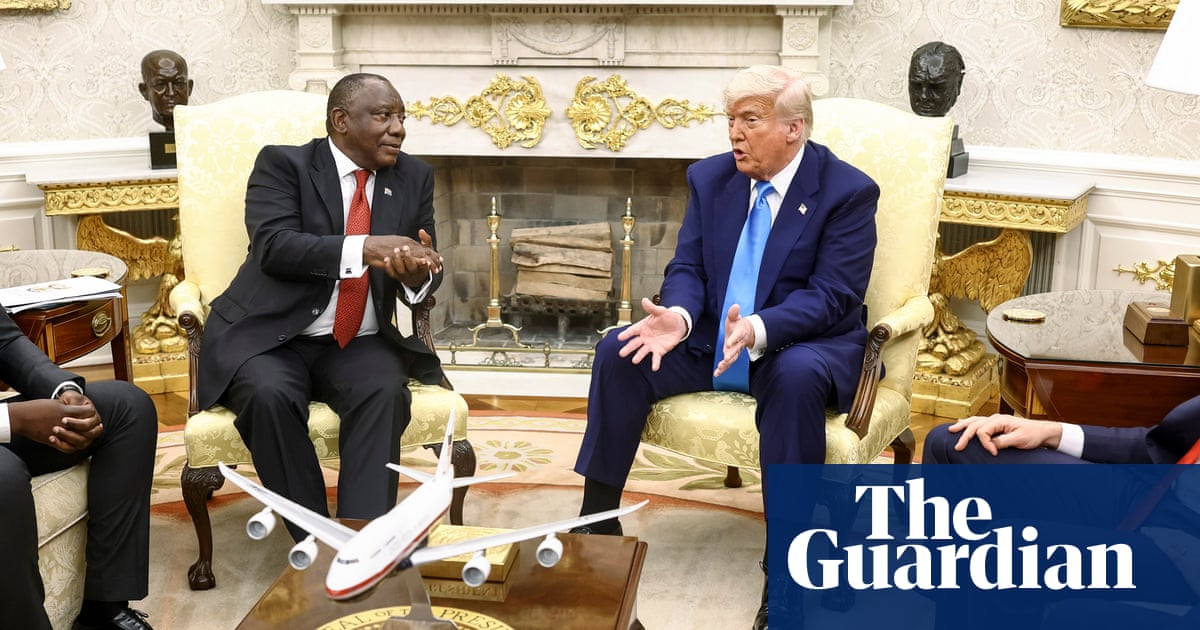It was an ambush crafted straight from a reality-TV playbook. The Oval Office meeting withSouth Africa’s president, Cyril Ramaphosa, started with exchanges of pleasantries, beforeDonald Trumpshouted “turn the lights down” and a video was played to support his false claims that white South African farmers are being murdered for their race.
Ramaphosa came prepared with champion white South African golfers Ernie Els and Retief Goosen, whom thegolf-mad Trump referred to as “friends”, as well as South Africa’s richest person, Johann Rupert.
Ramaphosa, who led the African National Congress (ANC) party’s delegation in the talks that ended apartheid white-minority rule three decades ago, needed to play his strongest cards.
In February, Trumpsigned an executive ordercutting aid to South Africa, accusing it of “unjust racial discrimination” against the white Afrikaner minority, which ruled the country during apartheid. The order criticised a South African law allowing land expropriation in limited circumstances and set up a program to bring Afrikaners to the US as refugees. The first grouparrived earlier this month.
South African media had speculated whether Ramaphosa was walking into a televised trap, like Ukraine’s president, Volodymyr Zelenskyy, had just a few months before.
The White House video was likely a surprise for the South Africans. It spliced together clips of Julius Malema, the leader of the far-left Economic Freedom Fighters (EFF) opposition party, saying “We are going to occupy land” and “We must never be scared to kill”, before singing the controversial Kill the Boer song (“Boer” is another name for Afrikaners and means “farmer” in Afrikaans).
Malema, whose populism is designed to shock – and whose EFF won just 9.5% of the vote in South Africa’s 2024 election – will probably be thrilled with the attention, after being buoyed up by South African courts ruling that Kill the Boer is not meant to be taken literally.
Former South African president Jacob Zuma, now leading his own opposition party, uMkhonto weSizwe (MK), also featured in the video, singing in Zulu: “We are going to shoot them. They are going to run.”
The video ended with a drone shot of white crosses lining a road where vehicles were queued. Trump said they were paying respects to more than 1,000 murdered white farmers. Ramaphosa said he had never seen the video, which South African-born billionaire and Trump adviser Elon Musk reshared after it wasposted on X in March.
Trump then whipped out a sheaf of printed-out news articles, intoning, “Death … death … death,” before handing it over to Ramaphosa.
It was not immediately clear where the white crosses were filmed or even if the footage is real. TheWhitkruis Monumentis a memorial to dead South African farmers, but the crosses are clustered on a hillside on private land.
While there have been farm murders involving horrific violence, killers interviewed in jail told Rudolph Zinn, a University of Limpopo professor, that they targeted victims of all races for cash and valuables. In the last quarter of 2024, South African policerecorded12 murders on farms, including Black-owned smallholder plots, out of almost 7,000 murders across the country.
Sign up toThis Week in Trumpland
A deep dive into the policies, controversies and oddities surrounding the Trump administration
after newsletter promotion
South Africa’s agriculture minister, John Steenhuisen, the Afrikaner leader of the ANC’s main rival, the Democratic Alliance – which gets the bulk of its support from white South Africans – said most farmers wanted to stay in South Africa. He also defended the DA’s coalition with the ANC to keep out the “rabble” EFF and MK parties.
The two golfers’ words were perhaps less helpful. Els was cryptic: “Two wrongs don’t make a right.” Goosen spoke of his brother’s “constant battle” with people trying to burn down and take away his farm.
However, their presence could snap Trump out of attack mode. “I respect champions,” he said. “I think the country is very lucky. They really wanted to be here, these two, they could have been on a beautiful fairway.”
South Africa’s most potent defender was Rupert, whose luxury goods conglomerate Richemont owns Cartier. Referring to Malema and Zuma, he said: “I’m their No 1 target.”
Rupert pointed out that all South Africans are targets of crime. He said how much his wife loved JD Vance’s autobiography and begged for Elon Musk’s Starlink satellite internet service at police stations.
It remains to be seen, though, whether a fellow billionaire and a few rounds with South Africa’s finest golfers will be enough to mollify Trump and persuade him to attend the G20 summit in Johannesburg in November.
